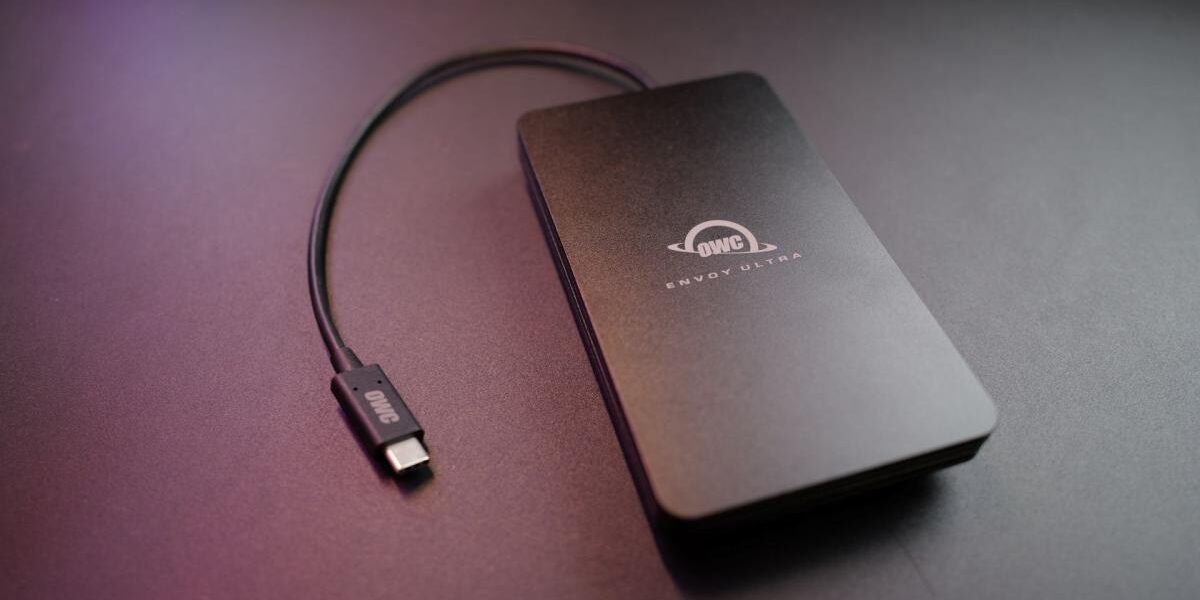OWC Envoy Ultra Thunderbolt 5 SSD review: A fast but fussy external storage solution
Note: This review was first published on 31 March 2025.

Portable SSDs that run on Thunderbolt 5 are exceedingly rare, but Other World Computing’s (OWC) Envoy Ultra Thunderbolt 5 SSD stands out as one of the few drives available today that genuinely takes advantage of Thunderbolt 5’s impressive 80Gbps transfer speeds. It’s an early mover in a market still catching up to Intel’s newest high-speed standard. And it’s not just power PC users who might find this external solution appealing – Apple users facing notoriously high internal SSD upgrade costs could also see this as a compelling upgrade. But the big question is whether this high-tech, external drive justifies the premium price it commands, or if there are too many compatibility hurdles to navigate.
There is a 2TB model that OWC is selling for US$379.99 and a 4TB at US$549.99. OWC sent me the 2TB model and the first thing that struck me about the Envoy Ultra was its striking build – this SSD doesn’t pretend to be a lightweight pocket drive. Instead, it feels substantial and reassuringly sturdy at around 250g. It has an undeniably premium feel too, thanks to a robust, sculpted aluminium casing. Yet, despite its rugged looks that pretty much screams “durability” the Envoy Ultra doesn’t explicitly carry an IP rating for waterproofing.
OWC also picked (wrongly, in my opinion) to use a captive cable design with the Envoy Ultra. It’s a double-edged sword in my experience, as it certainly prevents you from misplacing the critical Thunderbolt connection and limits flexibility when packing or organising your workspace. More importantly, being permanently attached means potential cable stress could be a long-term reliability concern. For a US$799 portable drive, and especially one that runs on Thunderbolt 5, I would have preferred it to come with detachable cables with robust weatherproof ports instead.

What about the performance? Thunderbolt 5 is theoretically capable of delivering bi-directional data transfer speeds of up to 80Gbps, compared to USB4’s 40Gbps. On paper, the Envoy Ultra promises to push external storage performance into territory previously occupied only by internal drives. My hands-on testing did validate much of the promise. With synthetic benchmarks using popular testing software like CrystalDiskMark, the Envoy Ultra easily exceeds 6GB/s sequential read speeds. I also have to point out that the Envoy Ultra is the first Thunderbolt 5 device I’ve tested, so there’s not competitor to compare with. But I’ve used the Samsung 990 Pro SSD – and internal M.2 NVMe SSD – as a reference point.
|
M.2 NVMe Samsung 990 Pro (Read / Write)
|
Envoy Ultra Thunderbolt 5 SSD (Read / Write)
|
|
|
SEQ1M, Q8T1
|
7,465 / 6,897
|
6068 / 5209
|
I can’t say definitively if the Envoy Ultra’s performance in this benchmark is better than other Thunderbolt 5 SSDs from the competition until we get to test more of them, but it does look good.
Yet, the most likely deal breaker here for potential buyers is likely compatibility – in my tests, the Envoy Ultra showed some unexpected limitations. Thunderbolt 5 might be backwards compatible on paper, but in reality, the situation isn’t quite as clear-cut. To exploit the full potential of Thunderbolt 5 speeds, PC users will need to have motherboards using the latest Intel Z890 chipset (and Intel Core Ultra series of processors). Meanwhile, Apple owners must have macOS 14 Sonoma or macOS 15 Sequoia, depending on your device – Macs running on Intel CPUs must run Sequoia explicitly. On a Thunderbolt 4-equipped PC (with an Intel Z790 chipset), the Envoy Ultra wasn’t recognised fully, remaining frustratingly inaccessible in Windows Explorer Finder or Disk Management despite physically connecting.
Price is another significant barrier, and one that can’t be dismissed lightly. At US$379 for the 2TB model, the Envoy Ultra isn’t an impulse buy. This premium is further emphasised when you consider that capable Thunderbolt 3 or USB4 drives are available at around half the cost, with compatibility that’s far less fussy.
Still, the comparison becomes notably less painful when set against Apple’s exorbitant internal SSD upgrade pricing—a jaw-dropping US$1,200 premium for a 4TB upgrade. In this context, the Envoy Ultra’s steep cost suddenly seems less outrageous. For those users who genuinely need the fastest external storage available and have a compatible Mac setup, this external SSD offers an appealing alternative.
It’s also worth mentioning that the SSD used inside the Envoy Ultra – the Auro Pro IV SSD – was first launched in 2022 and is beginning to show its age compared to some newer SSD technologies entering the market. It certainly felt like the Auro Pro IV was bottle-necking the Envoy Ultra’s Thunderbolt 5 capabilities in my experience with it – both gaming and content creations.

But my overall experience with the OWC Envoy Ultra left me impressed with its raw speed and quality construction but at the same time I have to recommend exercising cautions about its broader compatibility if you’re not using a PC with an Intel Z890 chipset or Apple M4 Pro / Max devices. It’s an external SSD undeniably aimed at a very niche segment: professionals or enthusiasts running the latest Thunderbolt 5 hardware who prioritise absolute speed over universal flexibility. If you happen to fall within this group, and budget willing, the Envoy Ultra makes a compelling case.
But for those operating across diverse hardware or hoping for easy cross-compatibility, there remain simpler, more cost-effective options. As it stands, OWC’s Envoy Ultra Thunderbolt 5 SSD is a glimpse into a future where external storage speeds rival internal drives. But, as is often the case with cutting-edge tech, that future isn’t entirely without its early teething pains.
Note: The OWC Envoy Ultra Thunderbolt 5 SSD is available for purchase at OWC’s e-store, with price starting from US$379.99 for the 2TB model.




